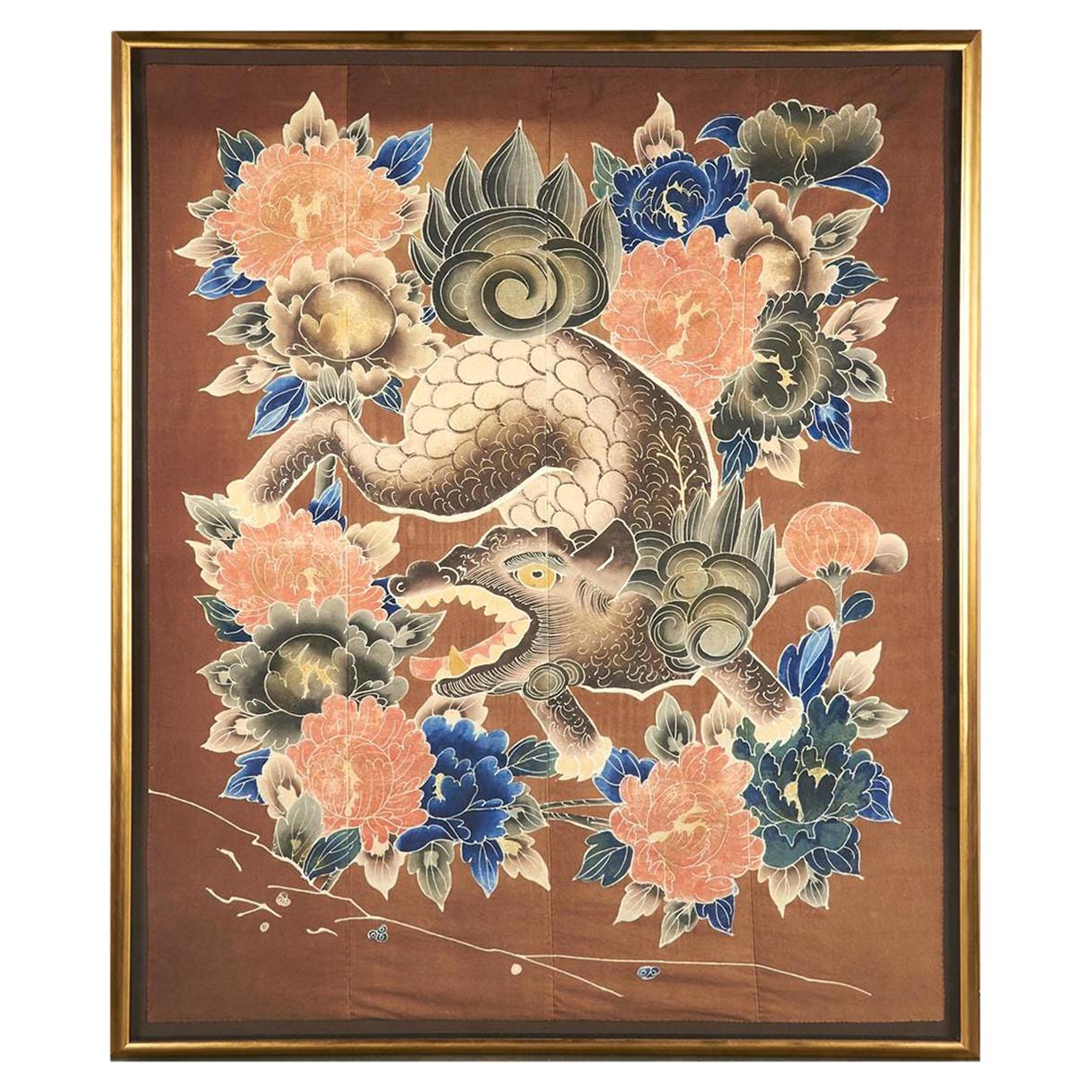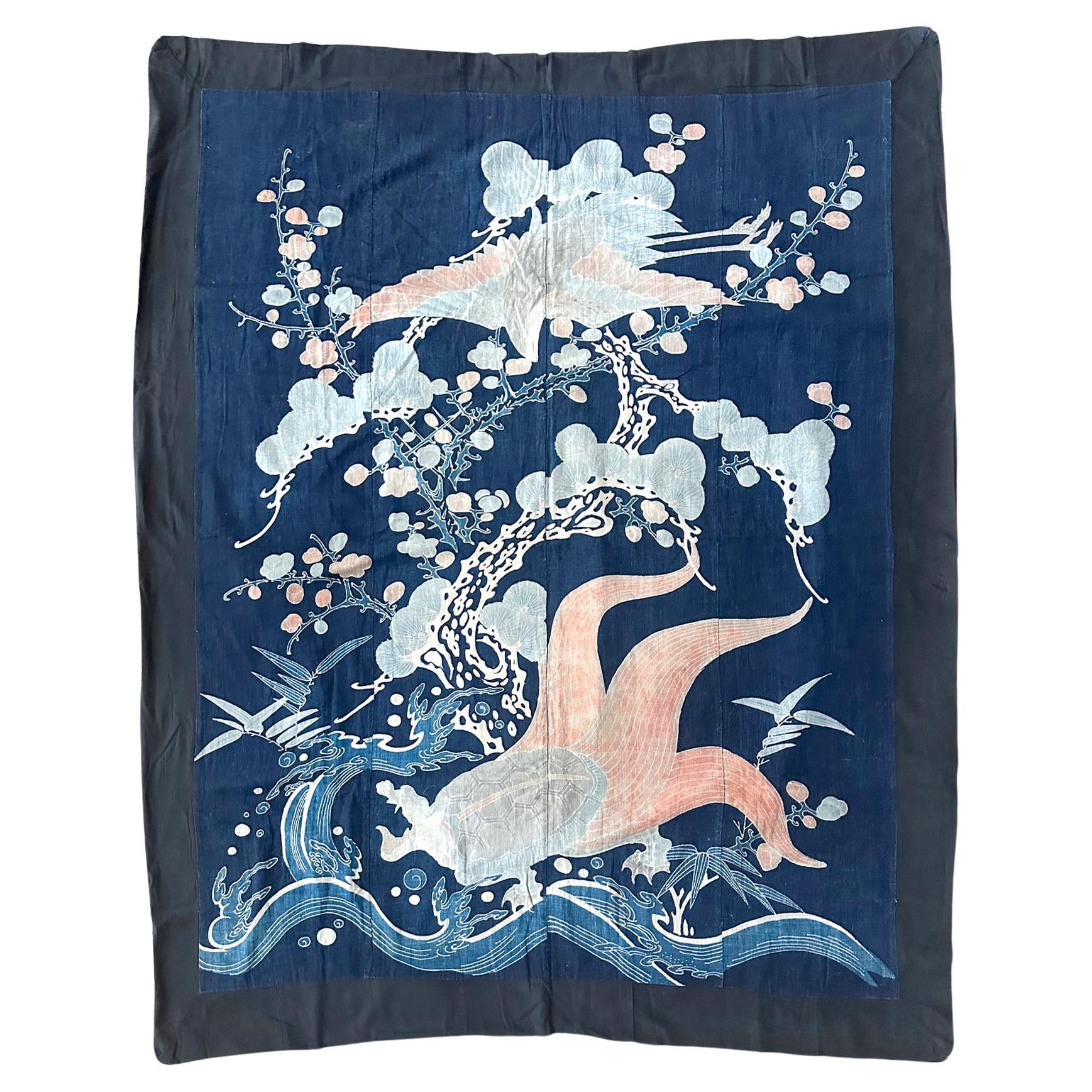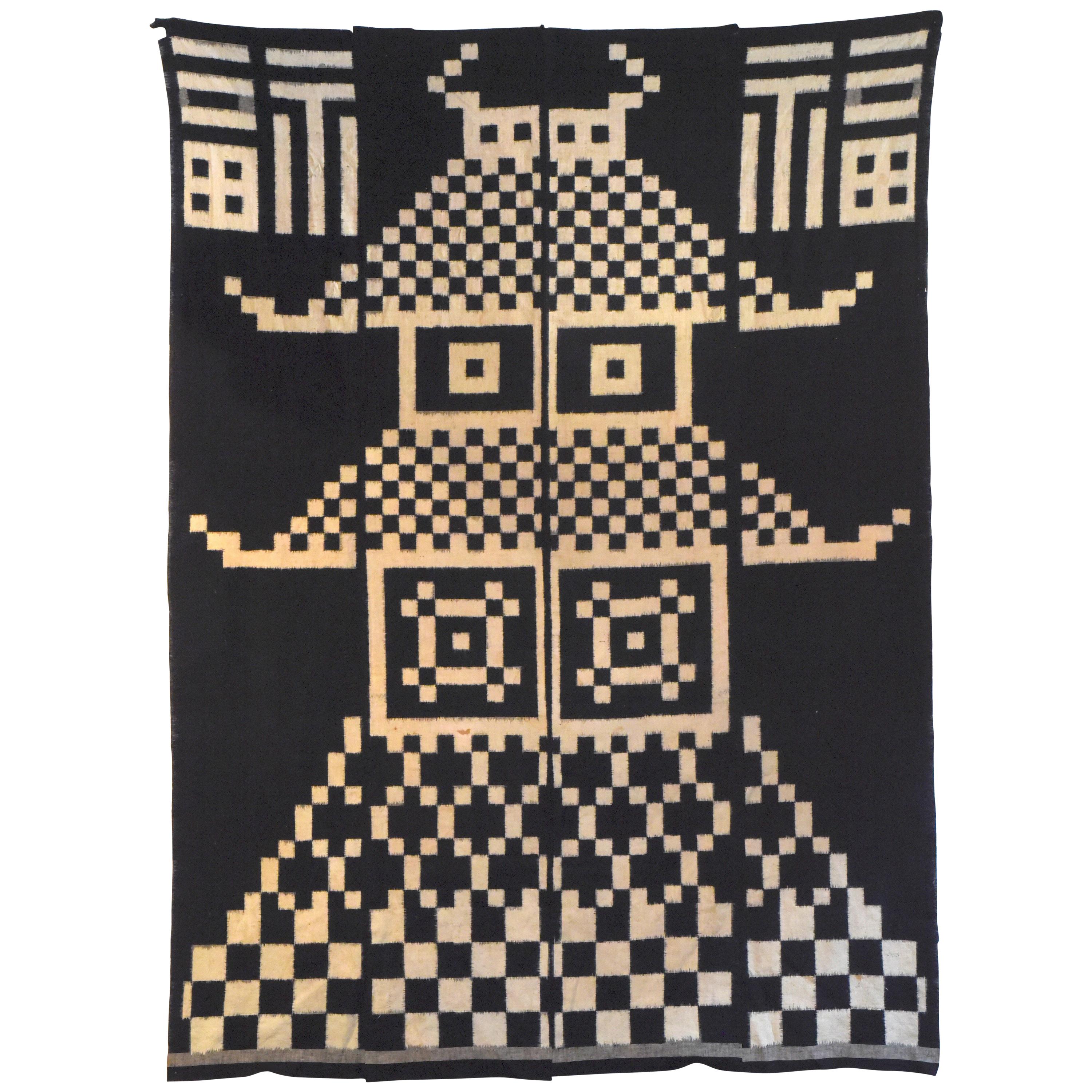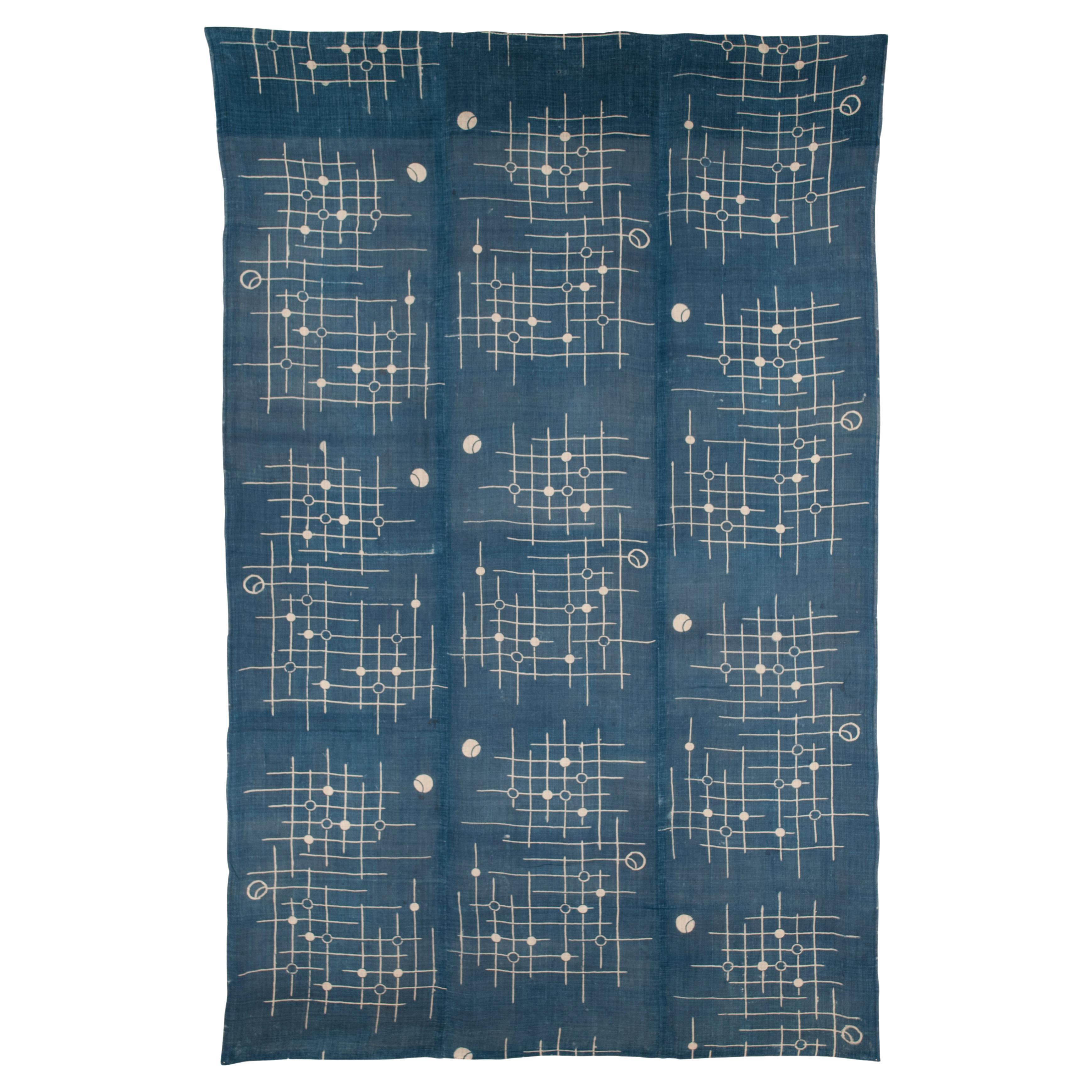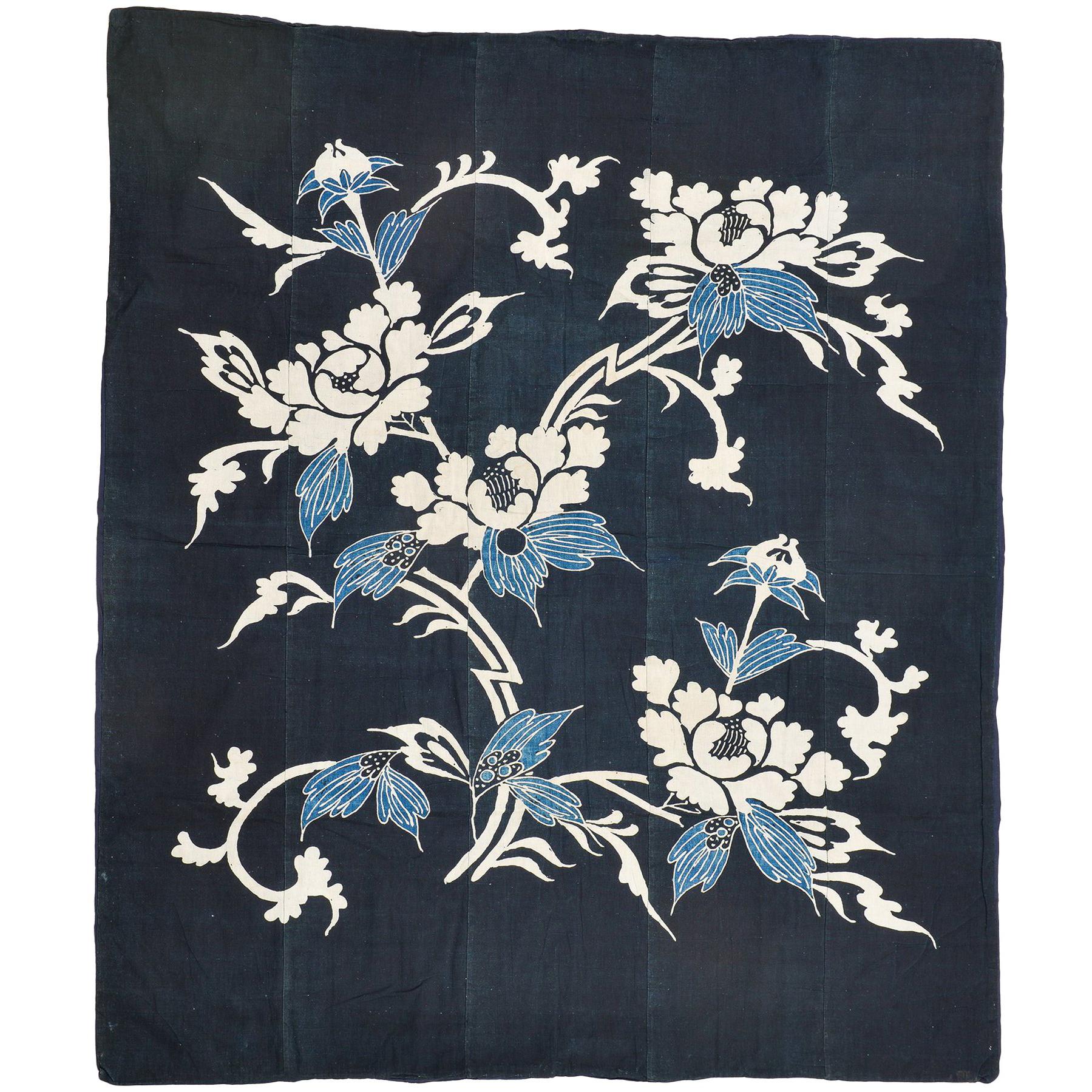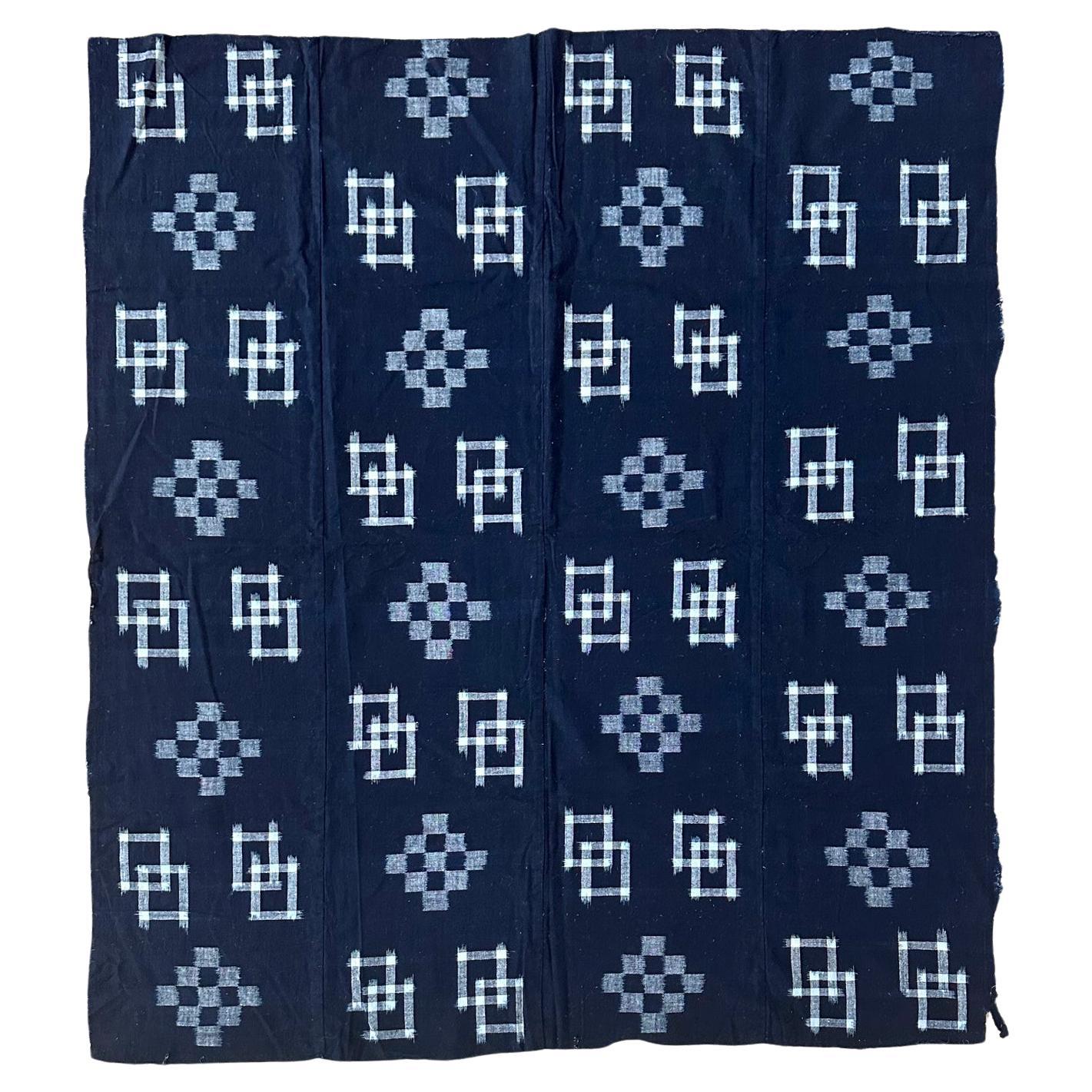Items Similar to Large Japanese Textile Futon Cover with Resist Yuzen Dye
Want more images or videos?
Request additional images or videos from the seller
1 of 13
Large Japanese Textile Futon Cover with Resist Yuzen Dye
About the Item
A large unframed Japanese textile art circa late early 20th century toward the end of the Meiji period. Seamed together from four vertical sections of cotton in deep indigo color, this large piece was made as a Futonji (futon cover) or Yutan (covering cloth) for domestic use. It showcases a beautiful pictorial design with two cranes, one standing, one flying on a background of pine tree, bamboo and plum blossom. On the lower right corner there is a longevity tortoise called Minogame in Japanese. The imagery is full of symbolism. The pine, bamboo and plum trees are collectively known as "three friends in winter". Their cold-resilient character represents inner strength. While minogame is the symbols of longevity, the red-crowned crane, beloved in Japan, project fidelity in marriage, good luck, long life and love. On four corners, there are prominent Choji mons (clover design), likely indicating the family which the Futonji belonged to.
Achieved using Tsutsugaki method of Yuzen dye, a technique of free hand resist dying using rice paste, which involves many painstaking steps, and all done by hands in the workshop, this panel retains vibrant colors and remains in remarkable condition. The back is fresh as it was likely taken off the futon cover a long ago and used as a wall hanging.
Reference: for several examples of Futonji and Yutan, see Textile of Japan: The Thomas Murray Collection at the Minneapolis Institute of Art" (Prestell) page 224-250.
- Dimensions:Height: 64 in (162.56 cm)Width: 48 in (121.92 cm)Depth: 0.2 in (5.08 mm)
- Style:Meiji (Of the Period)
- Materials and Techniques:Cotton,Dyed
- Place of Origin:
- Period:
- Date of Manufacture:Early 20th Century
- Condition:Wear consistent with age and use. Textile in overall good condition with vivid color and minor expected wear, spots of discoloration barely noticeable. Edges folded back and clean. No obvious stain or odor. Folding wrinkles.
- Seller Location:Atlanta, GA
- Reference Number:1stDibs: LU945038699632
About the Seller
5.0
Platinum Seller
These expertly vetted sellers are 1stDibs' most experienced sellers and are rated highest by our customers.
Established in 2006
1stDibs seller since 2010
478 sales on 1stDibs
Typical response time: <1 hour
- ShippingRetrieving quote...Ships From: Atlanta, GA
- Return PolicyA return for this item may be initiated within 2 days of delivery.
More From This SellerView All
- Framed Japanese Futon Cover Textile Art with Resist Yuzen DyeLocated in Atlanta, GAA large piece of framed Japanese textile circa late 19th to early 20th century, end of Meiji period. Seamed together from four vertical sectio...Category
Early 20th Century Japanese Meiji Textiles
MaterialsCotton, Wood
- Antique Large Japanese Futon Cover with Resist Yuzen DyeLocated in Atlanta, GAA large unframed Japanese Futonji textile art circa late 19th century toward the end of the Meiji period. Seamed together from four vertical sections of cotton in deep indigo color, ...Category
Antique 1890s Japanese Meiji Textiles
MaterialsCotton
- Japanese Textile Panel Double Ikat Kasuri Futon CoverLocated in Atlanta, GAA Japanese woven cotton textile panel with white pattern on indigo background circa 1900-20s (end of Meiji to Tasho period). The panel was joined by four vertical stripes and was tra...Category
Early 20th Century Japanese Meiji Textiles
MaterialsCotton
- Japanese Textile Panel Double Ikat Kasuri Futon CoverLocated in Atlanta, GAA Japanese woven cotton textile panel with white pattern on indigo background circa 1900-20s (end of Meiji to Tasho period). The panel was joined by four vertical stripes and was tra...Category
Early 20th Century Japanese Meiji Textiles
MaterialsCotton
- Framed Japanese Woven Textile Panel with Dragon Meiji PeriodLocated in Atlanta, GAA framed Japanese woven textile circa late 19th century of Meiji Period. Likely a fragment of a priest robe or kesa, the multi-paneled textile was finely woven with gold foiled threads that depicts a five-clawed dragon slithering in the clouds and water...Category
Antique 19th Century Japanese Meiji Textiles
MaterialsSilk, Wood
- Framed Japanese Festival Kimono with Tsutshugaki DyeLocated in Atlanta, GAA Japanese festival kimono expertly mounted and displayed in a large acrylic shadow box. This impressive ceremonial garment circa late 19th-early 20th century was made from a thick l...Category
Early 20th Century Japanese Japonisme Textiles
MaterialsTextile, Acrylic
You May Also Like
- Meiji Period Japanese Indigo Double Ikat Futon CoverLocated in Point Richmond, CAMeiji period Japanese Indigo double ikat futon cover Japanese futon cover, a double ikat pattern in four panels depicting Kumamoto Castle with im...Category
Antique 1890s Japanese Meiji Textiles
MaterialsCotton
- Early 20th Century Japanese Linen Go-Board Pattern Futon CoverLocated in Point Richmond, CAEarly 20th Century Japanese linen go-board pattern futon cover A unique example of a game-themed textile, this 3-panel futon cover is woven of very fine...Category
Early 20th Century Japanese Meiji Textiles
MaterialsHemp
- Japanese Indigo Antique Boro Futon Cover or Wall PanelLocated in Alessandria, PiemonteRare perfect antique collection Japanese Indigo Boro Futon cover : also to use. The rare antique boros are now valued as pieces of art, therefore they are...Category
Mid-20th Century Japanese Japonisme Textiles
MaterialsCotton
- Late 19th Century Japanese Stencil-Dyed Textile / Kumano-zomeLocated in Point Richmond, CALate 19th Century Japanese Stencil-Dyed Textile / Kumano-zome This 2-panel cotton textile was made in the Kumano region of Okayama Prefecture in th...Category
Antique Late 19th Century Japanese Meiji Textiles
MaterialsCotton
- Vintage Japanese Indigo Folk Kamon TextileLocated in Chicago, ILDating to the mid-20th century, this vintage Japanese textile is a folk example of traditional stencil dyed fabric, known as katazome. Richly...Category
Mid-20th Century Japanese Textiles
MaterialsCotton
- Vintage Japanese Indigo Folk Kamon TextileLocated in Chicago, ILDating to the mid-20th century, this vintage Japanese textile is a folk example of traditional stencil dyed fabric, known as katazome. Richly...Category
Mid-20th Century Japanese Textiles
MaterialsCotton
Recently Viewed
View AllMore Ways To Browse
Vintage Pair Asian Silk Embroidered Birds
Goat Hair Slipper
Moroccan Caftan White Ivory And Gold Brocade Kaftan
Wall Mirror Brushed Bronze
Deep Buttoned Chair
Swedish 1970 Stool
Verdigris Copper Hall
Brass Room Divider Mid Century Modern
Ice Bucket Brass And Glass
Glass Top Low Modern Design Coffee Table
Vintage Italian Walnut Chair
8 X 10 Area Rug Black
Bed Frame Black Leather
Mid Century Modern 1960s Floor Lamp Sweden
Structured Sectional
Pair Of Black Art Deco Chair
Chrome Square Side Table
White Chinese Vintage Vase
